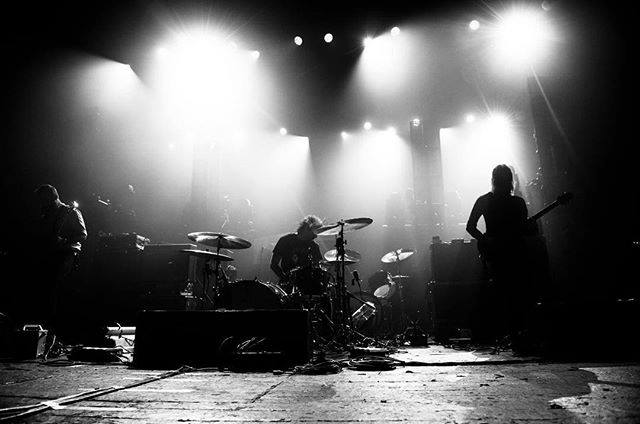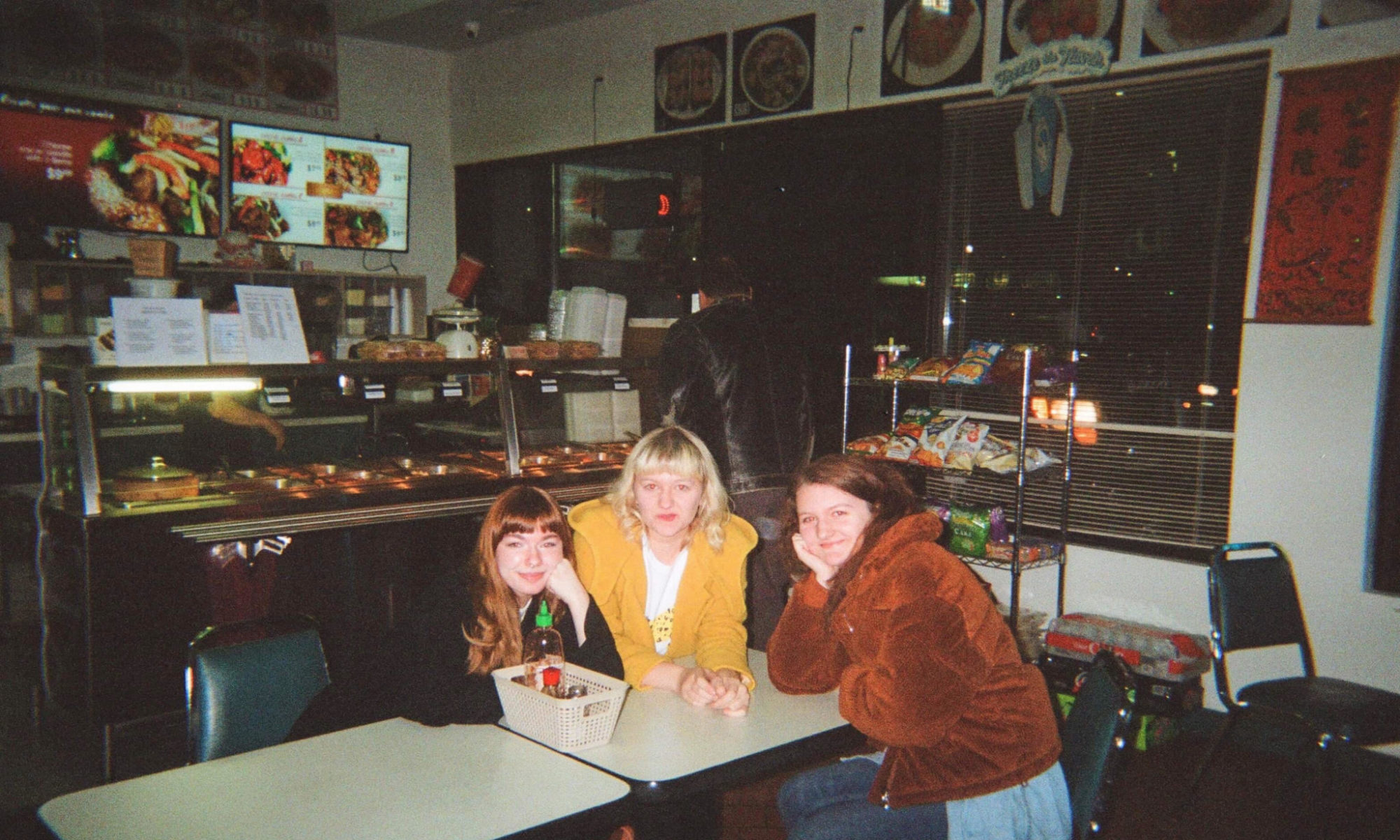
By Chris Bryson
Russian Circles perform in Winnipeg on April 8th at the Garrick Centre. Chris Bryson had the chance to chat with bassist Brian Cook to get a sense of the world of Russian Circles.Stylus: You’ll be coming through Winnipeg on a pretty extensive tour. How do you deal with the challenges of being away from home when on a long tour?
Brian Cook: Well, at this point the band has been doing this kind of thing for 13 years, and I’ve been touring for about 22 years, so at some point you just learn how to cope with it on some subconscious level. There are a few obvious things you can do to keep yourself sane: take solo walks away from the club, keep in contact with friends and loved ones back at home, try to eat well and exercise when you can. A friend advised me before my first tour to spend 10 minutes alone every day, and that’s good advice. I find the bigger challenge to be dealing with coming home. Tour has its own momentum. You get in the van and it takes you to your next destination. At home, you have to recalibrate your brain to be self-motivated. I occasionally see articles about musicians dealing with post-tour depression and it’s a very real thing. You go from being constantly in motion, constantly validated, and constantly surrounded by people to being static and alone. Dealing with that is the bigger challenge, in my opinion.
Stylus: Does the band ever change or alter its approach to songwriting and if so what have been some of the reasons for doing so?
BC: Every song is a little different. We all live in different states, so we end up trading a lot of audio files. Sometimes songs are cobbled together out of a bunch of different ideas, sometimes someone comes to the table with a fully written song, sometimes we just stumble across an idea when we’re all in a practice space together. We don’t have an established process.
Stylus: Being an instrumental band allows you to cover more ground stylistically with less need for adherence to a particular style. What aspects of your music do you think best benefit from this flexibility?
BC: We’re all music hunters, so we’re always exploring new artists and new sounds, but we obviously owe a lot to metal. And for me, honestly, most of the interesting guitar-based music happening today owes something to metal. But metal also has a tendency to cling to these aesthetics that can be a little cartoony and juvenile, and that winds up manifesting in a lot of the lyrics and vocal delivery in the genre. So being an instrumental band has benefitted us because it allows us to cull from the instrumental side of metal without having to shoehorn some campy frontman into our sound. I think it opens up our music because we’re not working with the limitations of a vocalist, and i think it provides us with a broader swath of listeners who might not be open to the guttural growl of the Corpsegrinder or the operatic wail of King Diamond.
Stylus: The music of Russian Circles is filled with an emotional weight buried within transcendental darkness. What are some of the inspirations and influences behind the narratives and ideas for your music?
BC: Any narratives are totally subconscious. We don’t have an active muse and we don’t write music based on a theme. I have nothing but respect for artists who can work off a concept, but for us, the music either resonates with us or it doesn’t. We don’t try to cobble together songs based on a preconceived notion; we write music based on what resonates with us on a very immediate base level.
Stylus: Was the looping of guitar always something the band has done to give added heft to your music? Are there any other methods the band uses to further amplify or give added effect to your sound?
BC: We’ve always tried to fill as much sonic space as possible. Looping allows us have multiple layers and multiple textures going at any given time. We’ve also incorporated things like the Moog Taurus so that one musician can play two instruments at a time. Ultimately, we really just want to make things texturally rich and dynamic, but we also want to adhere to the three-piece format without resorting to backing tracks or having a laptop on stage. There are a few other tricks we employ, but we can’t give away all of our secrets.
Stylus: What made the band decide to do a live album?
BC: The songs are constantly morphing. With our studio albums, we’re making adjustments and edits all the way up until mastering. Once the album is actually finished, the songs still wind up evolving in the live show. We don’t drastically alter them, but we find new things to highlight and new ways to simplify things. So there’d been some talk about trying to record a few shows at some point just to document how the songs had grown. The problem is that going into a show knowing it’s going to be under the microscope of recording would ultimately sap some of the energy out of the performance because we’d be trying to play things as meticulously as possible. It just so happened that the Dunk! Festival set was recorded without our knowing it, and it was a concert we were all very happy with. There are still a few flubs in the performance, but that’s the nature of live music.
Stylus: From what I’ve read Russian Circles is a band whose members don’t live in the same city and don’t get the chance to play together often. When it comes to sculpting and recording what songs or a final album will be, how do differences in ideas and opinions get resolved?
BC: If it doesn’t resonate with all three members of the band, the material gets scrapped. We’re all pretty open to criticism; no one is afraid to ditch a riff or mix up a part if it isn’t working. Honestly, the biggest conflicts in this realm have been pretty minor. I remember Mike really gunning for this one particular thrash riff that wasn’t really vibing with Dave. I was the mediator, and I told Mike the riff was really “fun”. That was enough for him to willingly scrap it. There is no fun allowed in Russian Circles.
Stylus: I read in an article with The Seventh Hex that with the music you create you said you “want to make something that sounds natural and human.” As an individual player and collectively as a band, how do you go about doing that?
BC: I’m just not a fan of music that sounds like it was built on a grid. I’m not opposed to using technology to make the recording process cheaper and smoother. It’s way more financially practical to record on ProTools than tape, after all. But I don’t want music to sound mechanical. There is very little electronic music that resonates with me because so much of it sounds like canned music. It doesn’t ignite my imagination. It just makes me think of someone sitting at a computer screen, staring at a grid, and plugging sounds into quantized beats. It really depresses me. I want music to be an escape from staring at a computer screen. And more and more rock music is recorded in that manner. The drummer doesn’t even play on a lot of current metal records; the engineer just samples drum tones and they plug those sounds into programmed beats. It’s no wonder so many modern rock records sound so sterile and flat. There is no push and pull. No space. No interaction between the instruments. I know that’s what some people really want out of their music—they want it to be perfect and crisp and even. But i prefer when it sounds like the band is so passionate about what they’re playing that they run the risk of mucking it all up. That’s way more exciting for me.
Stylus: Do you think it’s important when creating music (or any art) to maintain a balance between the pursuit of perfection and retaining immediacy and cohesion?
BC: Absolutely. I’ve been really digging this Workin’ With the Miles Davis Quintet record, and there’s one note Miles hits in the first song that sounds flat to my ears, and I totally love it. It’s jarring, but it reminds you that this album was made in a live environment. It’s a snapshot of a time and place. It’s not trying to create its own reality. And it makes all the moments where the band locks in and plays off each other feel that much more inspired. But I’m also someone that would rather spend five years listening to a record and wrapping my head around it than to hear something that’s beat-detected, auto-tuned, and ultimately designed to be instantly digestible and quickly forgotten. I want to make art that’s still interesting ten, twenty, thirty years down the road. And as someone that still buys vinyl, I only want to spend money on music that still excites me after a decade or two of repeated spins.
Stylus:. Will the band be bringing any new elements into the fold with the next music you put out? Can you tell me anything about the next Russian Circles release?
BC: Hopefully. There are a lot of ideas floating around, but we haven’t yet started to put the album together, so who knows. There been discussion of trying to make a darker, uglier album, but we also have a tendency to wind up writing songs with the opposite mood of what was initially intended. So we’ll see what happens.
Stylus: If you were to give one piece of advice to a musician/band trying to make it in the musical world as it is today, what would it be?
BC: Well, first things first, you would need to define “making it.” When I first started playing in bands, all I wanted to do was play a show. Then it was just a matter of putting out a record. Then the goal was to tour. And that’s about it. I had “made it” by the time I was 18. “Making it” should really just be about creating something you’re proud of, and everything else is just icing on the cake. At this point, I’m way more interested in musicians like Sir Richard Bishop or Daniel Higgs—musicians that have a history of doing whatever the fuck they want even if it means they only draw 50 people in their hometown or only sell a few hundred records. It’s more exciting to see someone make art that makes them happy than to see someone try to build a lucrative career pleasing other people. So my advice is to do whatever you want and do it passionately. Be involved in your musical community. Go see other bands. Support underground venues. Buy bands’ merch. Throw your own shows. Make your own tapes or records or CDs. Value your own art. Make it special. Make it sacred.

